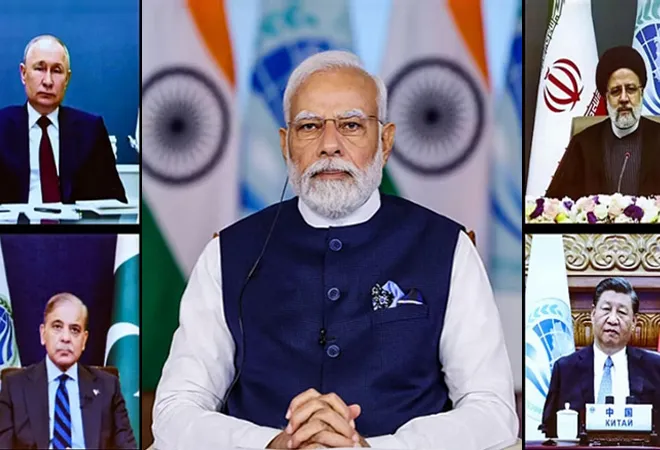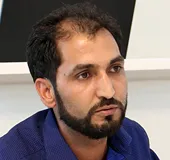
Against the backdrop of great power competition and a fragile geopolitical world order, New Delhi hosted the 23rd Summit of the Council of Heads of State of the Shanghai Cooperation Organisation (SCO) on
4 July 2023. After assuming the rotating presidency in the historic city of Samarkand, Uzbekistan, New Delhi relentlessly pursued SCO’s regional collaboration and cooperation agenda. It
hosted 134 events, including 14 ministerial-level meetings, aimed at strengthening internal ties and promoting unity within this diverse and often conflicting group. Its solid commitment to fairness and diplomacy with a constructive agenda highlighted India’s increasing centrality in the current multipolar world order. During the SCO Summit, after rigorous evaluation and consideration, the Islamic State of Iran was
granted full member status, as India passed the SCO presidency baton to the Republic of Kazakhstan.
After assuming the rotating presidency in the historic city of Samarkand, Uzbekistan, New Delhi relentlessly pursued SCO’s regional collaboration and cooperation agenda.
Access to various multilateral fora, including the SCO, is crucial for India to pursue its geopolitical and geoeconomic interests across different regions as a rising global power. The SCO offers New Delhi the chance to safeguard, advance, and showcase its geostrategic and geoeconomic pursuits in the Central Asian and South Asian regions. In 2017, India became a full member of the SCO to lend a democratic character to this multilateral organisation, otherwise packed with authoritarian leaders and autocratic countries.
During the 2023 presidency, India took a strong stance to promote new areas of development, including startups and innovation, traditional medicine, digital inclusion, youth empowerment, and the shared Buddhist heritage among most of the SCO member states. As part of this commitment, India established two new mechanisms—the Special Working Group on Startups and Innovation and the Expert Working Group on Traditional Medicine—significantly demonstrating New Delhi's dedication to contributing to regional economic and social transformations.
The Summit adopted the ‘
SECURE’ SCO theme, where S stands for security of citizens; E for economic development for all; C for connecting the region; U for uniting the people; R for respect for sovereignty and integrity; and E for environmental protection. This was coined by Prime Minister Narendra Modi at the Qingdao Summit in 2018, to make the region “
secure, stable and prosperous”. The Summit highlighted the importance of people-to-people contacts and reaffirmed India’s commitment to revive and deepen its centuries-old civilisational, spiritual, and cultural ties with other member countries. During the SCO presidency, New Delhi showcased its rich cultural heritage by declaring the ancient city of Kashi (Varanasi) the first SCO Tourist and Cultural Capital.
The SCO offers New Delhi the chance to safeguard, advance, and showcase its geostrategic and geoeconomic pursuits in the Central Asian and South Asian regions.
India used the SCO as a platform to secure its northern border from Pakistan's state-sponsored terrorism. While Islamabad has supported terrorism in Jammu and Kashmir since 1989, the Afghanistan-Pakistan region has become a cradle of terrorism, supporting radical elements in Central Asia and Eurasia. Despite the formidable challenge of tackling Pakistan’s state-sponsored terrorism, India staunchly advocated for regional anti-terrorism cooperation. Building on the vital support for its anti-terror campaign from the UN Comprehensive Convention on International Terrorism (CCIT) in 2018, India successfully raised the issue of terrorism during its SCO presidency. India firmly stood for the SCO’s Regional Anti-Terrorist Structure (RATS) as an indispensable mechanism for effective regional counterterrorism cooperation and action. India strongly advocated for the adoption of English as one of the primary languages used within the SCO to ensure seamless communication and coordination in regional counterterrorism efforts. Additionally, India's demand for "an Afghan-led, Afghan-owned and Afghan-controlled" peace process received support from all SCO Central Asian members and Russia. The agreements on counterterrorism, security cooperation, and defence between India and the Central Asian Republics further demonstrated the significant progress made by New Delhi through the SCO.
Pakistan has relentlessly stonewalled India's attempts to pursue its cultural, strategic, and economic interests by refusing regional connectivity networks via its territory. China has used the tense relationship between Pakistan and India to advance its parochial interests in the SCO region through its ambitious and often-exploitative Belt and Road Initiative (BRI). The Chinese BRI projects have created a debt crisis and violated the sovereignty and integrity of SCO countries. The increased debt crisis has triggered a wave of
anti-China protests in the SCO region, mainly in Central Asia. To overcome the China-Pakistan axis, New Delhi invested in
Chabahar Port and the 7,200-km long International North-South Transport Corridor (INSTC). These connectivity initiatives led by New Delhi are consultive, transparent, economical, and reliable. Through its inclusive and participatory approach, most SCO countries have explored options to join India-led connectivity projects bilaterally and multilaterally. In 2020,
New Delhi provided a US$1-billion line of credit to Central Asian countries to develop infrastructure projects and also
constructed Tajikistan's Dushanbe-Chortut highway, strengthening its geostrategic and economic interests in Eurasia.
Despite the formidable challenge of tackling Pakistan’s state-sponsored terrorism, India staunchly advocated for regional anti-terrorism cooperation.
New Delhi assumed SCO's presidency during a fragile global geopolitical environment and the Russia-Ukraine conflict. This conflict highly curtailed Moscow's ability to balance China's hegemonic and belligerent behaviour within the grouping. New Delhi leveraged its rising diplomatic clout and global stature to successfully incapacitate Chinese hegemonic interests to use the SCO as a block for its geostrategic, geoeconomic, and regional benefits amidst China’s intense rivalry with the United States. India's increased global economic and political influence helped to consolidate its position as a key player in transforming the SCO into a development-focused organisation in Eurasia. Rather than being an anti-West alliance, India emphasised the significance of maintaining peace and security following the UN Charter to promote the collective prosperity of the region.
India has strengthened its diplomatic ties and intellectual capital while also advocating a progressive agenda on connectivity, counterterrorism, and Afghanistan. Despite several Western scholars terming the SCO as a China-created and China-dominated grouping, India’s presidency served as an invaluable platform for the country to gain recognition as a crucial regional power and establish itself as a constructive, reliable, and trusted partner for all SCO member states. However, a pre-occupied Russia, China’s relentless pursuit of hegemonic ambitions, Pakistan’s stubborn rejection of allowing connectivity through its territory, and the opportunistic China-Pakistan bonhomie will continue to restrict SCO’s regional and global impact.
Ayjaz Wani is a Fellow in the Strategic Studies Programme at the Observer Research Foundation.
The views expressed above belong to the author(s). ORF research and analyses now available on Telegram! Click here to access our curated content — blogs, longforms and interviews.



 Against the backdrop of great power competition and a fragile geopolitical world order, New Delhi hosted the 23rd Summit of the Council of Heads of State of the Shanghai Cooperation Organisation (SCO) on
Against the backdrop of great power competition and a fragile geopolitical world order, New Delhi hosted the 23rd Summit of the Council of Heads of State of the Shanghai Cooperation Organisation (SCO) on PREV
PREV


